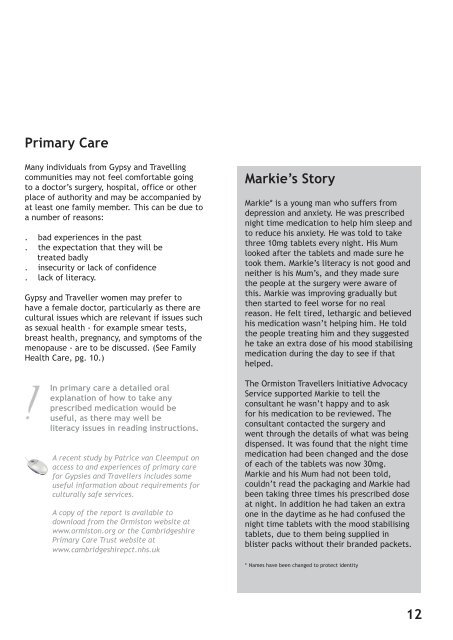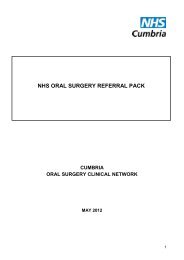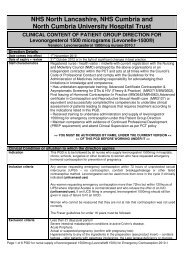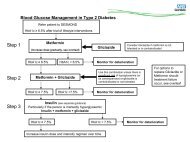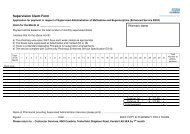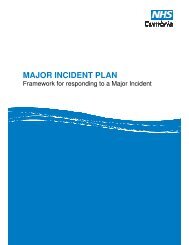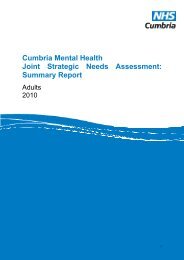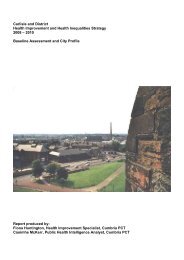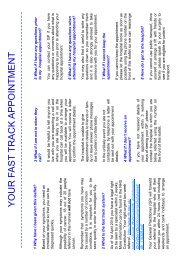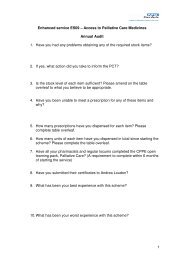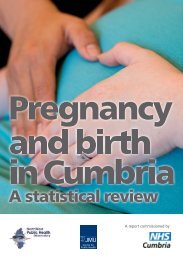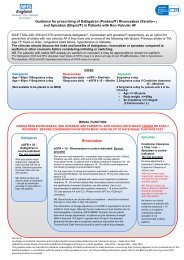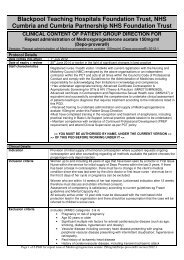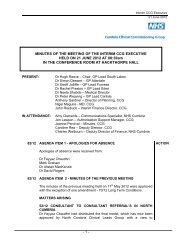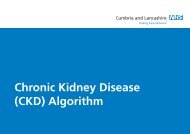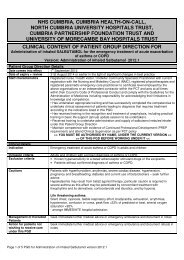Cambridgeshire Health Booklet - NHS Cumbria
Cambridgeshire Health Booklet - NHS Cumbria
Cambridgeshire Health Booklet - NHS Cumbria
You also want an ePaper? Increase the reach of your titles
YUMPU automatically turns print PDFs into web optimized ePapers that Google loves.
Primary Care<br />
Many individuals from Gypsy and Travelling<br />
communities may not feel comfortable going<br />
to a doctor’s surgery, hospital, office or other<br />
place of authority and may be accompanied by<br />
at least one family member. This can be due to<br />
a number of reasons:<br />
. bad experiences in the past<br />
. the expectation that they will be<br />
treated badly<br />
. insecurity or lack of confidence<br />
. lack of literacy.<br />
Gypsy and Traveller women may prefer to<br />
have a female doctor, particularly as there are<br />
cultural issues which are relevant if issues such<br />
as sexual health - for example smear tests,<br />
breast health, pregnancy, and symptoms of the<br />
menopause - are to be discussed. (See Family<br />
<strong>Health</strong> Care, pg. 10.)<br />
In primary care a detailed oral<br />
explanation of how to take any<br />
prescribed medication would be<br />
useful, as there may well be<br />
literacy issues in reading instructions.<br />
A recent study by Patrice van Cleemput on<br />
access to and experiences of primary care<br />
for Gypsies and Travellers includes some<br />
useful information about requirements for<br />
culturally safe services.<br />
A copy of the report is available to<br />
download from the Ormiston website at<br />
www.ormiston.org or the <strong>Cambridgeshire</strong><br />
Primary Care Trust website at<br />
www.cambridgeshirepct.nhs.uk<br />
Markie’s Story<br />
Markie* is a young man who suffers from<br />
depression and anxiety. He was prescribed<br />
night time medication to help him sleep and<br />
to reduce his anxiety. He was told to take<br />
three 10mg tablets every night. His Mum<br />
looked after the tablets and made sure he<br />
took them. Markie’s literacy is not good and<br />
neither is his Mum’s, and they made sure<br />
the people at the surgery were aware of<br />
this. Markie was improving gradually but<br />
then started to feel worse for no real<br />
reason. He felt tired, lethargic and believed<br />
his medication wasn’t helping him. He told<br />
the people treating him and they suggested<br />
he take an extra dose of his mood stabilising<br />
medication during the day to see if that<br />
helped.<br />
The Ormiston Travellers Initiative Advocacy<br />
Service supported Markie to tell the<br />
consultant he wasn’t happy and to ask<br />
for his medication to be reviewed. The<br />
consultant contacted the surgery and<br />
went through the details of what was being<br />
dispensed. It was found that the night time<br />
medication had been changed and the dose<br />
of each of the tablets was now 30mg.<br />
Markie and his Mum had not been told,<br />
couldn’t read the packaging and Markie had<br />
been taking three times his prescribed dose<br />
at night. In addition he had taken an extra<br />
one in the daytime as he had confused the<br />
night time tablets with the mood stabilising<br />
tablets, due to them being supplied in<br />
blister packs without their branded packets.<br />
* Names have been changed to protect identity<br />
12


